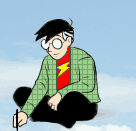Spiegelman was Right! (again)
June 7th, 2010
Running late this morning, so just time for a quick one.
Paul Laroquod points to an interesting Scientific American article about the history, influence, and value of simplified line art and its relatives. Along the way, they point out a correlation between great line artists and lazy eyes.
Art Spiegelman has been saying for years that his own impaired vision in one eye probably influenced his own 2-D world of comics and art, but I doubt he ever expected science to back him up.














It seems to me that Spiegelman is right about most things.
All science truly does is ascribe labels to things that already existed, self evident truths as everything is, well besides names and dates; In the majority of cases most of those things were already labeled, however those labels have ceased to be a sufficient avatar in discription to our current minds… Science is just like the Latin vernacular was when it surfaced, a more ‘literal’ translation of our existence. It just has more identifiable words than it’s predecessors, but isn’t anymore true, just more descriptive and now more identifiable. Science is just a language like every other form of communication, it merely ascribes words to what already was, is and in most instances, shall be… I’m sorry to veer off the subject a bit Scott and this is certainly not a reproof to any, but an open observation in a venue I felt would recieve it best… Hope your day isn’t too hectic!.. 😉
Legit tangents are always welcome, Jeremy.
Thanks for your thoughts. 🙂
Well, that’s the beauty of science. The addition of the descriptive language makes these pre-existing concepts easier to be manipulated and applied in our lives.
Just like the invention of a non-pictorial alphabet allowed for much easier communication over abstract concepts like “compassion,” “pity,” and “jealousy.”
Wow, I never thought of that before and it makes a lot of sense. Of course it’s a minor thing that would not set apart line artists from the rest of the people, but it is certainly a nice point. I have a nearly perfect eyesight and I don’t have any problems with 3d, but quite often during my studies I blur my vision trying to flat the object so it becomes easier for me to draw. I even share this as a tip to my coleagues, but I could not have thought that this would apply within this context of artists with lazy eye.
And Jeremy, science’s work is not to label things, is to study things. 99% of the work is the research, we only get the eyes on the 1% that is the conclusion. Spiegelman had a personal experience and a conclusion for himself, but it was a guess, a feeling. Of course it doesn’t make it more or less true, but for sure it is a matter of beign more or less reliable and with science we can learn much much more so we get to conclusions that are much closer from the actual truth.
I loved that article and I hope that studies as such can help people leave behind the idea that simple lines are somehow less valuable than a complex, close to reality art. I’m specifically sad about all of the 3d animation films we get and few 2d animations these days…
oh, sweet vindication! my girlfriend noticed my eyes are a little off-kilter lately, blaming it on the uncountable hours i spend doing art on my computer. i figured looking a bit like a boston terrier was a manageable sacrifice. now though, whenever i see michelangelo and rothko talking shop at a party, i can proudly walk over, wink my lazy eye, and let them know i’m part of the club. i wonder if they have a secret handshake…
Hmm, I have a lazy eye, sadly I never had the drive to turn it into serious artistic accomplishment. I must say I can always see my lazy eye in photos, as the article suggests, but other people seem somewhat oblivious to it (and on reflection I rarely notice other people with lazy/misaligned eyes)…
On Jeremy’s point, science does more than describe, for example it also creates new situations never before seen. On the theoretical side the implications of our descriptions remain out of reach until analyzed (by logic, math or inductive reasoning) and so many truths remain to be uncovered that sit latent in our descriptions. Finally science is a multifaceted ever evolving activity and so like much in life can not really be summarized.
Glad you liked it, Scott! When I read it I immediately thought how well it dovetails with your observations on how we can identify more easily with simplified faces vs. attempts to render them objectively.
Would there also be a correlation between Alan Moore’s visual sense – despite the fact that he’s not all that great a line artist himself – and his dead eye? The world must know!